12 start with E start with E
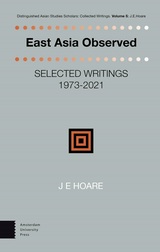



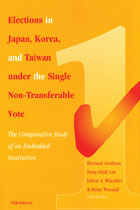
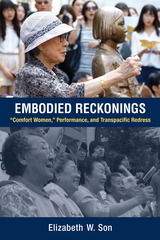
Based on extensive archival and ethnographic research, the study argues for the central role of performance in how Korean survivors, activists, and artists have redressed the histories—and erasures—of this sexual violence. Merging cultural studies and performance theory with a transnational, feminist analysis, the book illuminates the actions of ordinary people, thus offering ways of reconceptualizing legal and political understandings of redress that tend to concentrate on institutionalized forms of state-based remediation.
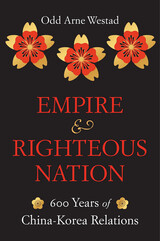
From an award-winning historian, a concise overview of the deep and longstanding ties between China and the Koreas, providing an essential foundation for understanding East Asian geopolitics today.
In a concise, trenchant overview, Odd Arne Westad explores the cultural and political relationship between China and the Koreas over the past 600 years.
Koreans long saw China as a mentor. The first form of written Korean employed Chinese characters and remained in administrative use until the twentieth century. Confucianism, especially Neo-Confucian reasoning about the state and its role in promoting a virtuous society, was central to the construction of the Korean government in the fourteenth century. These shared Confucian principles were expressed in fraternal terms, with China the older brother and Korea the younger. During the Ming Dynasty, mentor became protector, as Korea declared itself a vassal of China in hopes of escaping ruin at the hands of the Mongols. But the friendship eventually frayed with the encroachment of Western powers in the nineteenth century. Koreans began to reassess their position, especially as Qing China seemed no longer willing or able to stand up for Korea against either the Western powers or the rising military threat from Meiji Japan. The Sino-Korean relationship underwent further change over the next century as imperialism, nationalism, revolution, and war refashioned states and peoples throughout Asia. Westad describes the disastrous impact of the Korean War on international relations in the region and considers Sino-Korean interactions today, especially the thorny question of the reunification of the Korean peninsula.
Illuminating both the ties and the tensions that have characterized the China-Korea relationship, Empire and Righteous Nation provides a valuable foundation for understanding a critical geopolitical dynamic.

“The relationship between China and Korea is one of the most important, and least understood, in Asia. With the wisdom and clarity we have come to expect from Westad, this book illuminates the long history of these two neighbors.”
—Rana Mitter, author of China’s Good War
“A timely must-read primer on the China–Korea relationship…and its impact on and implications for our world today.”
—Carter J. Eckert, author of Park Chung Hee and Modern Korea
“Valuable and wide-ranging…As two thousand years of history have shown, China’s role in Korea is a complex one. Westad’s short and stimulating study provides many clues to understanding that relationship.”
—J. E. Hoare, Literary Review
“An insightful and entertaining primer on Korean history over the last 600 years.”
—Popular History Books
Koreans long saw China as a mentor and protector. Chinese culture heavily influenced Korea, whose first written language used Chinese characters, while Confucianism shaped the structure of Korean government. This deep, sometimes fraught, relationship has done more to shape the politics of the region than many realize.
During the Ming Dynasty, Korea agreed to become a vassal of China, in hopes of escaping ruin at the hands of the Mongols. The connection frayed in the nineteenth century, when the Qing, beset by domestic problems, did little to protect Korea from encroaching Western powers or the imperial designs of Meiji Japan. The relationship shifted again in the twentieth century as nationalism, revolution, and war refashioned Asia. Odd Arne Westad lays bare the disastrous impact of the Korean War on the region and offers a keen assessment of Sino–Korean interactions today, including the thorny question of reunification.

By the turn of the twentieth century, Japan’s military and economic successes made it the dominant power in East Asia, drawing hundreds of thousands of Chinese, Korean, and Taiwanese students to the metropole and sending thousands of Japanese to other parts of East Asia. The constant movement of peoples, ideas, and texts in the Japanese empire created numerous literary contact nebulae, fluid spaces of diminished hierarchies where writers grapple with and transculturate one another’s creative output.
Drawing extensively on vernacular sources in Japanese, Chinese, and Korean, this book analyzes the most active of these contact nebulae: semicolonial Chinese, occupied Manchurian, and colonial Korean and Taiwanese transculturations of Japanese literature. It explores how colonial and semicolonial writers discussed, adapted, translated, and recast thousands of Japanese creative works, both affirming and challenging Japan’s cultural authority. Such efforts not only blurred distinctions among resistance, acquiescence, and collaboration but also shattered cultural and national barriers central to the discourse of empire. In this context, twentieth-century East Asian literatures can no longer be understood in isolation from one another, linked only by their encounters with the West, but instead must be seen in constant interaction throughout the Japanese empire and beyond.

Empire of the Dharma explores the dynamic relationship between Korean and Japanese Buddhists in the years leading up to the Japanese annexation of Korea. Conventional narratives cast this relationship in politicized terms, with Korean Buddhists portrayed as complicit in the “religious annexation” of the peninsula. However, this view fails to account for the diverse visions, interests, and strategies that drove both sides.
Hwansoo Ilmee Kim complicates this politicized account of religious interchange by reexamining the “alliance” forged in 1910 between the Japanese Soto sect and the Korean Wonjong order. The author argues that their ties involved not so much political ideology as mutual benefit. Both wished to strengthen Buddhism’s precarious position within Korean society and curb Christianity’s growing influence. Korean Buddhist monastics sought to leverage Japanese resources as a way of advancing themselves and their temples, and missionaries of Japanese Buddhist sects competed with one another to dominate Buddhism on the peninsula. This strategic alliance pushed both sides to confront new ideas about the place of religion in modern society and framed the way that many Korean and Japanese Buddhists came to think about the future of their shared religion.
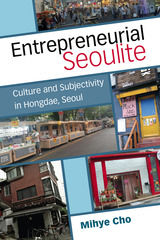
Recent research on Korean culture approaches the K-wave phenomenon from the perspectives of cultural consumption, media analysis, and cultural management and policy. Meanwhile, studies on Seoul have centered on its transformation as a global, creative city. Rather than examining the K-wave or the city itself, this book explores the experience of living through the city-in-transition, focusing on the relationship between “the ideology that justified engagement in capitalism” and the “subjectification process.” The book aims to understand the project to institutionalize a cultural district in Hongdae as a demonstration of the coevolution of ideologies and citizenship in a society undergoing rapid liberalization—politically, culturally, and economically.
A cultural turn took place in Korea during the 1990s, amid the economic prosperity driven by state-led industrialization and the collapse of the military dictatorship due to democratization movements. Cultural critiques, emerging as an alternative to social movements, proliferated to assert the freedom and autonomy of individuals against regulatory systems and institutions. The nation was hit by the Asian financial crisis in 1997, and witnessed massive economic restructuring including layoffs, stakeouts, and a prevalence of contingent employment. As a result, the entire nation had to find new engines of economic growth while experiencing a creative destruction. At the center of this national transformation, Seoul has sought to recreate itself from a mega city to a global city, equipped with cutting-edge knowledge industries and infrastructures.
By juxtaposing the cultural turn and cultural/creative city-making, Entrepreneurial Seoulite interrogates the formation of new citizen subjectivity, namely the enterprising self, in post-Fordist Seoul. What kinds of logic guide individuals in the engagement of new urban realities in rapidly liberalized Seoul—culturally and economically? In order to explore this query, Mihye Cho draws on Weber’s concept of “the spirit of capitalism” on the formation of a new economic agency focusing on the re-configuration of meanings, and seeks to capture a transformative moment detailing when and how capitalism requests a different spirit and lifestyle of its participants. Likewise, this book approaches the enterprising self as the new spirit of post-Fordist Seoul and explores the ways in which people in Seoul internalize and negotiate this new enterprising self.
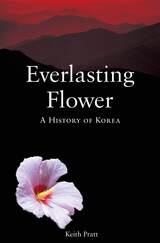
Everlasting Flower traverses the ancient physical and cultural landscape of the Koreas, spanning from the ancient states of Old Choson and Wiman Choson to the present day. Pratt reveals the rich origins of such cultural foundations as religious practices and food and drink, and he connects them to key historical developments of both nations. He also probes controversial historical events such as the abuses—torture, punishment, and the “comfort women”—of the Japanese occupation. Concise and richly illustrated pictorial essays augment Pratt’s compelling narrative, chronicling various monuments of Korea’s past, including the world’s oldest observatory and the famous turtle boats.
An engrossing and provocative history of the two Koreas, Everlasting Flower is an essential study of two nations that are rapidly emerging from the shadows of their looming neighbors—China and Japan—and of each other as well. As the Korean peninsula becomes an increasingly important geopolitical hotspot, Everlasting Flower offers a broad perspective on this painfully divided nation.
READERS
Browse our collection.
PUBLISHERS
See BiblioVault's publisher services.
STUDENT SERVICES
Files for college accessibility offices.
UChicago Accessibility Resources
home | accessibility | search | about | contact us
BiblioVault ® 2001 - 2024
The University of Chicago Press









